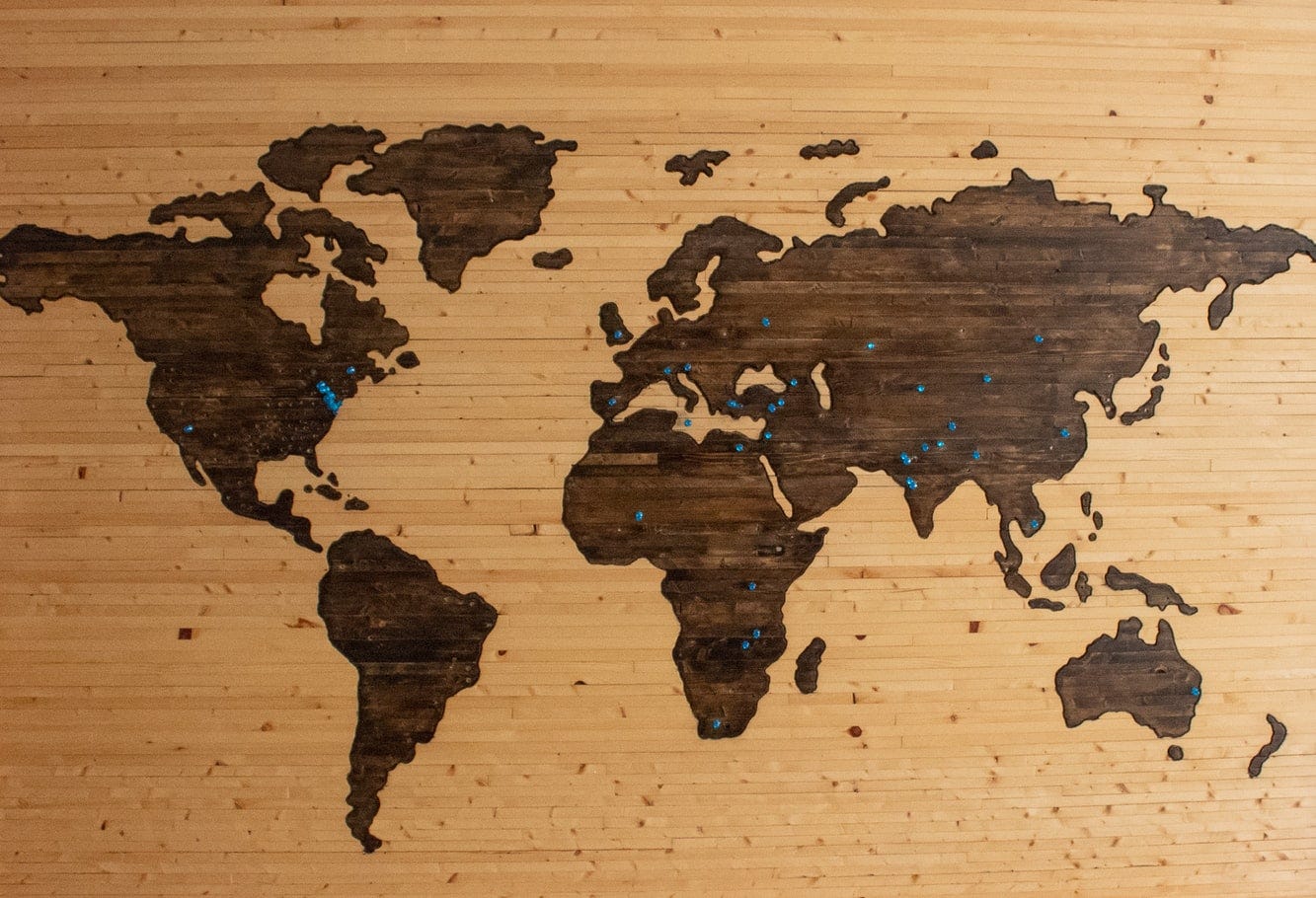Forward Thinking Media - The 3 Economies Of The Internet
Over the next century, the internet will be the great equalizer. I have no doubt that over the long tail, the internet will not just fix many of the problems it created, but pioneer a world that is an order of magnitude better than what came before it. I don’t think this happens all at once though. For me, I see it through a lens of economies that are supposed to unfold one after the other. Unfortunately, I think we’re going a little out of order:
The Knowledge Economy includes any and all information published on the internet, including how it is shared. Any post, how-to video, or educational guide belongs in the Knowledge Economy. It includes Google, which organizes the world’s knowledge. Twitter, which organizes the world’s conversations. Hubspot too, which taught companies that they could use the Knowledge Economy to grow their businesses through inbound marketing. These are a few (of the many) titans of the Knowledge Economy. I would say the first two or three decades of the internet were focused on building it out. And to be honest, I think it has served its purpose. Anyone with an internet connection has access to learn about anything in seconds. And they have. Kids in Africa can learn how to dance like kids in LA. Young adults in India can understand how mathematics work as well as the best students at Harvard. And adults in Spain can learn how to start a startup just like Y Combinator grads. The information is out there for anyone to learn. This does bring up a key cultural issue though. It isn’t culturally acceptable for a European teen to have the same level of startup competency as one living in SF. Yet, this is exactly what has happened, due to the Knowledge Economy. And it’s not just startups. It’s every subject. Due to the proliferation of knowledge, more qualified people are simply showing up. More people aren’t just applying to YC. More QUALIFIED people are applying. More people aren’t just applying for jobs. More QUALIFIED people are applying for jobs. How? It’s because these people soaked up knowledge and succeeded in the first economy of the internet. They became masters of their craft by learning online, which has made them qualified. The problem is that the world doesn’t have great mechanisms for filtering a mass amount of qualified people. The new issue that arises from it is a lack of access for millions of talented creators, workers, and craftsmen. They my have the skills, but there is no way to actually prove it. The End of the Knowledge EconomyThe Knowledge Economy had a great run. Trillions of dollars in value were created, millions were lifted to new income brackets through entrepreneurship, and some of the world’s hardest problems were solved simply because the answers could be accessed on the internet. But we’ve gotten to a point as a society where there is too much knowledge and it’s outpaced our ability to filter people with that knowledge. There are hundreds of blog posts for how to get into an Ivy League school, but only so many spots availble. There are millions of people starting companies but investors are still only funding people in their network, because of the trust filter. Job positions get so overrun with candidates that recruiter doesn’t even reject anyone anymore; They just don’t have time to reply. All of this is a consequence of the world having more knowledge than ever before. This is a good thing, but enough is enough! It’s time we move on to the next economy of the internet; The Access Economy What is the Access Economy?If the knowledge economy gave everyone the opportunity to be experts in a field, the access economy is the ultimate human organizer. It matches up the qualified individuals with the right opportunities while using a completely new framework for evaluating and identifying talent. If the Knowledge Economy thrived on resumes and applications, the Access Economy must pioneer something completely new. Resumes and applications weren’t designed to properly assess millions of qualified people. Luckilly, there are a few companies working on this already. Who’s Already Here?Pioneer - Founded by ex YC partner Daniel Gross, Pioneer is a VC firm taking a novel approach to filtering. Instead of letting institutions judge the value of the startups that apply, startups get peer-reviewed by other founders in a tournament style environment, and the best rise to the top over time. Crash - Crash is a company founded by Isaac Moorehouse, showing people that they can be their own credential based on the projects they create and the links they put out into the world. Crash is innovating in the access economy by creating their own access out of thin air. Upwork/Fiverr - Upwork and Fiverr, the major gig economy leaders, have innovated on how to determine who is worthy of work based on prior experiences of customers fused with a portfolio. They match up millions of freelancers to jobs every year, and they do this without relying on old-school applications or resumes. These are imperfect answers, but the only way to find the right one is to start exploring. Unfortunately, I don’t have too many more examples of companies in this world. Very few people are spending time thinking about the Access Economy right now. The mainstream crowd is still thinking about the Knowledge Economy. They still want to create content, make everything a media company, and own every keyword on Google. On the contrary, many of our brightest innovators have skipped the Access Economy and have moved to the Commerce Economy. What is the Commerce Economy?The Commerce Economy is all things finance on the internet. Which really means all things blockchain. I do believe Bitcoin will be the digital gold, but that will just be the tip of the iceberg for this economy. In the Commerce Economy, money flows across borders seamlessly. Smart contracts replace 80% of IRL middlemen, all the kids play games like CryptoKitties or Axie Infinity, and the market for trading Cryptopunks or Bored Ape’s is at an all-time high. Right now, I think most technologists want us to make the leap from the Knowledge Economy to the Commerce Economy of the internet, as they think "blockchain will solve all of our problems”. They see this trustless technology as the great equalizer and it’s all kumbaya after blockchain is 100% adopted. I somewhat agree with this, but I feel like this technology is literally where the internet was in the 70s or 80s. Just because it’s possible doesn’t mean it’s feasible to solve problems for billions of people. Now all the innovators could work their asses off to speed up this timeline, but even if they do, I think a critical part of the online infrastructure will be missing. The Knowledge Economy organized all of the information. But now we need the Access Economy to organize all of the people and their talents. Then the Commerce Economy can organize who gets all the money. In that order. Charging Ahead (Or Going Back) To The Access EconomyI humbly ask the innovators in the world to spend less time in the Commerce Economy of the internet and join us in the Access Economy. Why? Because the world needs it to be built more than ever. We have millions of unknown geniuses all around the world that could solve our biggest problems, but we don’t know who they are or how to find them. Yes, we have companies like Pioneer, Crash, and Upwork, etc. that are paving the way, but the Knowledge Economy wasn’t created by a few companies. It was created by thousands of companies and got buy-in from millions of internet civilians. Who will be the Google or Facebook of the access economy? What will the business models be? What will the unintended consequences be? Will the US poverty rate decrease? Will global income mobility increase? These are all questions that come up when I think of the Access Economy. It’s exciting, yet nerve-racking. The stakes couldn’t be higher and we have so much to build. But brick by brick, we can build the infrastructure to not just identify who the experts truly are, but organize them in a way that leads to prosperity that the world hasn’t seen before. I hope you’ll join us. If you liked this post from Mat Sherman's Newsletter, why not share it? |
Older messages
Invest In Sparkles
Thursday, July 22, 2021
Meet The Best Performing Asset
Lose Battles, Not Wars
Friday, July 16, 2021
"Never give up" is flawed advice
Three Sunday Links - July 11th, 2021
Sunday, July 11, 2021
Here are three links I saw today that I think you'll all find interesting.
Investment Thesis #1 - Personafi
Saturday, July 10, 2021
Building Substack for Investment Analysts
Stay In Your Lane
Friday, July 2, 2021
VCs don't solve problems; they fund the problem solvers
You Might Also Like
🚀 Ready to scale? Apply now for the TinySeed SaaS Accelerator
Friday, February 14, 2025
What could $120K+ in funding do for your business?
📂 How to find a technical cofounder
Friday, February 14, 2025
If you're a marketer looking to become a founder, this newsletter is for you. Starting a startup alone is hard. Very hard. Even as someone who learned to code, I still believe that the
AI Impact Curves
Friday, February 14, 2025
Tomasz Tunguz Venture Capitalist If you were forwarded this newsletter, and you'd like to receive it in the future, subscribe here. AI Impact Curves What is the impact of AI across different
15 Silicon Valley Startups Raised $302 Million - Week of February 10, 2025
Friday, February 14, 2025
💕 AI's Power Couple 💰 How Stablecoins Could Drive the Dollar 🚚 USPS Halts China Inbound Packages for 12 Hours 💲 No One Knows How to Price AI Tools 💰 Blackrock & G42 on Financing AI
The Rewrite and Hybrid Favoritism 🤫
Friday, February 14, 2025
Dogs, Yay. Humans, Nay͏ ͏ ͏ ͏ ͏ ͏ ͏ ͏ ͏ ͏ ͏ ͏ ͏ ͏ ͏ ͏ ͏ ͏ ͏ ͏ ͏ ͏ ͏ ͏ ͏ ͏ ͏ ͏ ͏ ͏ ͏ ͏ ͏ ͏ ͏ ͏ ͏ ͏ ͏ ͏ ͏ ͏ ͏ ͏ ͏ ͏ ͏ ͏ ͏ ͏ ͏ ͏ ͏ ͏ ͏ ͏ ͏ ͏ ͏ ͏
🦄 AI product creation marketplace
Friday, February 14, 2025
Arcade is an AI-powered platform and marketplace that lets you design and create custom products, like jewelry.
Crazy week
Friday, February 14, 2025
Crazy week. ͏ ͏ ͏ ͏ ͏ ͏ ͏ ͏ ͏ ͏ ͏ ͏ ͏ ͏ ͏ ͏ ͏ ͏ ͏ ͏ ͏ ͏ ͏ ͏ ͏ ͏ ͏ ͏ ͏ ͏ ͏ ͏ ͏ ͏ ͏ ͏ ͏ ͏ ͏ ͏ ͏ ͏ ͏ ͏ ͏ ͏ ͏ ͏ ͏ ͏ ͏ ͏ ͏ ͏ ͏ ͏ ͏ ͏ ͏ ͏ ͏ ͏ ͏ ͏ ͏ ͏ ͏ ͏ ͏ ͏ ͏ ͏ ͏ ͏ ͏ ͏ ͏ ͏ ͏ ͏ ͏ ͏ ͏ ͏ ͏ ͏ ͏ ͏ ͏ ͏ ͏ ͏ ͏ ͏ ͏
join me: 6 trends shaping the AI landscape in 2025
Friday, February 14, 2025
this is tomorrow Hi there, Isabelle here, Senior Editor & Analyst at CB Insights. Tomorrow, I'll be breaking down the biggest shifts in AI – from the M&A surge to the deals fueling the
Six Startups to Watch
Friday, February 14, 2025
AI wrappers, DNA sequencing, fintech super-apps, and more. ͏ ͏ ͏ ͏ ͏ ͏ ͏ ͏ ͏ ͏ ͏ ͏ ͏ ͏ ͏ ͏ ͏ ͏ ͏ ͏ ͏ ͏ ͏ ͏ ͏ ͏ ͏ ͏ ͏ ͏ ͏ ͏ ͏ ͏ ͏ ͏ ͏ ͏ ͏ ͏ ͏ ͏ ͏ ͏ ͏ ͏ ͏ ͏ ͏ ͏ ͏ ͏ ͏ ͏ ͏ ͏ ͏ ͏ ͏ ͏ ͏ ͏ ͏ ͏ ͏ ͏ ͏ ͏ ͏ ͏ ͏
How Will AI-Native Games Work? Well, Now We Know.
Friday, February 14, 2025
A Deep Dive Into Simcluster ͏ ͏ ͏ ͏ ͏ ͏ ͏ ͏ ͏ ͏ ͏ ͏ ͏ ͏ ͏ ͏ ͏ ͏ ͏ ͏ ͏ ͏ ͏ ͏ ͏ ͏ ͏ ͏ ͏ ͏ ͏ ͏ ͏ ͏ ͏ ͏ ͏ ͏ ͏ ͏ ͏ ͏ ͏ ͏ ͏ ͏ ͏ ͏ ͏ ͏ ͏ ͏ ͏ ͏ ͏ ͏ ͏ ͏ ͏ ͏ ͏ ͏ ͏ ͏ ͏ ͏ ͏ ͏ ͏ ͏ ͏ ͏ ͏ ͏ ͏ ͏ ͏ ͏ ͏ ͏ ͏ ͏ ͏ ͏ ͏ ͏ ͏





